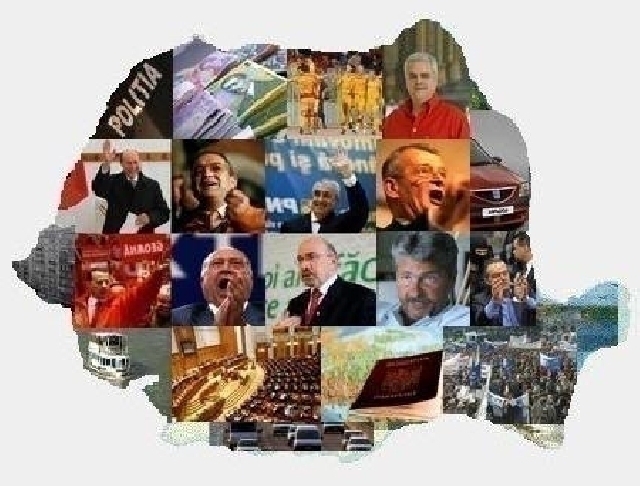The Week in Review, October 20-27
A roundup of the week's main stories

România Internațional, 25.10.2014, 14:03
Dismissals and resignations within the Social Democratic Party, the most important party of the government coalition
It’s been a tough week for the Social Democratic leader Victor Ponta, who runs for president in the November 2nd elections. His party has lately been shaken by corruption scandals and infighting over the party’s future leadership. Given the circumstances, Victor Ponta had no choice but to bring party members to order. On Tuesday, during an emergency meeting, the Social Democrats decided to suspend three of their emblematic leaders from all the functions they held within the party. Mayor of Bucharest’s District 5, Marian Vanghelie, and Sebastian Ghita, a millionaire Member of Parliament, were sanctioned for heavy language used during recent exchanges. Also suspended was the party spokesperson himself, Senator Dan Sova, who was indicted Monday by anti-corruption prosecutors for influence peddling. Deputy Viorel Hrebenciuc, the former leader of the Social Democratic group in Parliament, is being investigated in the same case. He resigned from Parliament, after being accused of using his influence with Sova to persuade the latter to introduce an amnesty and pardons bill in Parliament. Hrebenciuc is also under investigation for influence peddling, alongside Deputy Ioan Adam and Senator Ilie Sarbu, both from the Social Democratic Party, in the case of the return of tens of thousands of hectares of forest, a case in which prosecutors claim the state incurred losses of over 300 million Euros. Investigated in the same case, Andrei Hrebenciuc, the son of Viorel Hrebenciuc, has been placed under preventive arrest for 30 days. He is accused of setting up a criminal group, of complicity to influence peddling and money laundering.
Romania’s President attended the autumn European Council in Brussels
Romanian President Traian Basescu attended the European Council meeting, on Thursday and Friday in Brussels, focusing mainly on energy security, climate change and eradicating Ebola. After heated debates, European leaders have struck a broad climate change pact obliging the EU as a whole to cut greenhouse gas emissions by at least 40% by 2030 as compared to 1990. A 27% target was agreed for renewable energy market share. New measures were approved to reduce the EU’s gas and electricity dependency, against the crisis in Ukraine and the Middle East. Another important decision taken at the Summit was to put Christos Stylianides, the new EU Commissioner for Humanitarian Aid and Crisis Management, in charge of dealing with the Ebola issue in Europe. The EU has also decided to earmark 25 million euros to create a vaccine against the deadly virus.
Romanian Foreign Minister holds talks with the NATO Secretary General
The Romanian Foreign Minister Titus Corlatean had a meeting on Tuesday in Brussels with the NATO’ new Secretary General, Jens Stoltenberg. Talks focused on ways of implementing the decisions made at the recent NATO summit in Wales, the priorities of the new NATO head and various topical issues related to international relations. Corlatean said Romania would actively contribute to outlining the North Atlantic alliance’s long-term response to the security situation in the Black Sea area. The Romanian Minister pleaded for a substantial strengthening of cooperation between the Alliance and its Eastern partners, particularly Georgia, Ukraine and the Republic of Moldova, and reiterated Bucharest’s steady support for NATO’s open door policy. In his turn, the NATO official thanked Romania for its substantial political and military contribution within NATO, for strengthening the Alliance’s ability to deal with the new security challenges and for developing cooperation with other international organisations.
European Research Centre in the Danube Delta
The south-eastern Romanian village of Murighiol, located in the Danube Delta Biosphere Reserve, will host the command centre of a pan-European research project. Romanian and European scientists will look for solutions to problems such as flooding, landslides or pollution. The centre will also train experts in this field.
The Magurele-based Integrated Centre for Advanced Laser Technology has been inaugurated
The strongest laser in Europe and the second largest in the world will become operational in Magurele, close to the city of Bucharest, as of 2017. Part of this project, the Integrated Centre for Advanced Laser Technologies in Magurele, which, starting 2018, will conduct programs of configuration and preparation of nuclear physics experiments, was inaugurated on Tuesday. Minister delegate for research and development Mihnea Costoiu has said that this centre opens new prospects for research in physics, chemistry, biology, medicine, energy, and many other fields, which will also impact Romanian economy.
European Parliament Ok-ed the New European Commission
The European Parliament approved on Wednesday, in Strasbourg, the new European Commission headed by Jean-Claude Junker, due to take office on 1st of November. Romania’s Corina Cretu will be part of the new European Commission, as holder of the regional policy portfolio.



























